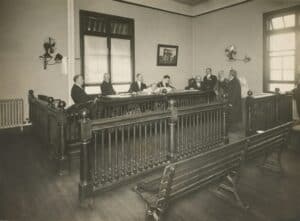Complex legal cases often hinge on technical information that judges and juries can’t understand without professional guidance from qualified experts. Medical malpractice, product liability, and personal injury cases frequently involve scientific or technical concepts that require translation into language that non-experts can grasp and apply to legal decisions.
An expert witness brings credibility, clarity, and authority to complicated cases by explaining technical concepts in understandable terms while providing professional opinions that support legal arguments. Their testimony can sway juries and strengthen arguments in ways that ordinary witnesses and documentary evidence alone cannot achieve.
Understanding why expert witnesses often determine case outcomes helps clients and attorneys recognize when professional testimony becomes essential for success. These specialized witnesses serve as strategic assets in litigation rather than optional additions that might be helpful if budgets allow.
Explaining Technical Concepts to Juries
Medical testimony requires translation of complex diagnoses, treatment procedures, and injury mechanisms into language that jurors without medical training can understand and apply to their deliberations. Expert physicians can explain why certain treatments were necessary, how injuries occurred, and what long-term consequences patients will face.
Engineering analysis helps juries understand how products failed, why structures collapsed, or how accidents occurred through mechanical failures that aren’t obvious to non-technical observers. These explanations often determine whether juries assign fault to manufacturers, contractors, or other parties in product liability cases.
Financial expert testimony becomes crucial in business litigation and personal injury cases where economic damages must be calculated using sophisticated methods that account for future losses, present value calculations, and market factors. These complex calculations often determine settlement ranges and jury award amounts.
Scientific evidence interpretation helps juries understand DNA analysis, chemical testing, accident reconstruction, and other technical evidence that requires professional knowledge to evaluate properly. Without expert guidance, complex evidence often gets misunderstood or ignored by juries who don’t know how to interpret technical data.
Establishing Causation and Liability
Medical causation opinions connect accidents or exposures to specific injuries and health problems in ways that establish clear links between defendants’ actions and victims’ damages. These professional opinions often make the difference between successful claims and dismissed cases where causation can’t be proven.
Accident reconstruction experts analyze physical evidence, vehicle damage, and scene conditions to determine how crashes occurred and who was responsible for causing them. Their testimony often overrides conflicting witness accounts and provides objective analysis of fault determination.
Product defect analysis requires specialized knowledge about design standards, manufacturing processes, and failure modes that most people don’t understand without professional training. Expert engineers can explain why products failed and whether failures resulted from defects or misuse.
Standard of care testimony in professional malpractice cases establishes what reasonable professionals should have done under similar circumstances, providing benchmarks against which defendants’ actions can be measured. These opinions often determine whether professional conduct meets acceptable standards.
Countering Opposing Expert Testimony
Credibility battles between competing experts often determine case outcomes when both sides present qualified professionals with different opinions about technical issues. The expert who communicates more effectively and appears more credible typically influences jury decisions more than pure technical qualifications.
Cross-examination preparation helps experts defend their opinions against aggressive questioning designed to undermine their credibility and conclusions. Well-prepared experts can maintain their positions under pressure while poorly prepared witnesses often damage their own cases.
Methodology challenges focus on attacking the techniques and assumptions that opposing experts used to reach their conclusions, potentially undermining entire expert opinions by showing flaws in analytical approaches. These technical challenges require deep understanding of professional standards and accepted practices.
Bias exposure attempts to show that opposing experts have financial incentives or professional relationships that might affect their objectivity and opinions. Successful bias challenges can neutralize expert testimony by making it appear unreliable or purchased rather than objective.
Choosing the Right Expert Witness
Qualification assessment involves evaluating education, experience, publications, and professional recognition that establish experts’ credibility with judges and juries. Board certifications, academic appointments, and peer recognition often matter more than just years of experience in relevant fields.
Communication skills become crucial because experts must explain complex concepts clearly and persuasively to audiences without technical backgrounds. Brilliant professionals who can’t communicate effectively often fail as expert witnesses despite their superior knowledge and qualifications.
Case-specific experience with similar technical issues often matters more than general expertise in broad fields, making it important to find experts who have dealt with specific types of problems rather than just general knowledge areas. Relevant experience adds credibility to opinions.
Trial experience helps experts handle cross-examination pressure and courtroom procedures that can intimidate professionals who are experts in their fields but inexperienced with litigation. Experienced expert witnesses know how to maintain their credibility under aggressive questioning.
Conclusion
Expert witnesses serve as strategic assets in complex litigation because they provide the technical knowledge and professional credibility that cases often need for success. Their ability to translate complicated concepts into understandable terms often determines whether juries can make informed decisions about technical issues.
Quality expert witness selection and preparation can mean the difference between winning and losing cases where technical evidence plays important roles. The investment in qualified experts typically pays for itself through better case outcomes and higher damage awards when technical testimony supports legal arguments effectively.
Smart attorneys recognize that expert witnesses aren’t optional luxuries but essential tools for achieving success in cases involving technical complexity that exceeds normal jury knowledge. The right expert witness can transform weak cases into strong ones while strengthening already solid cases for maximum impact.
